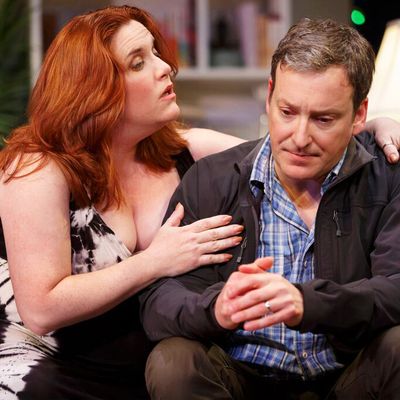
Before a word is spoken in Bruce Norris’s new play The Qualms, now at Playwrights Horizons, audiences hear the sound of nervous laughter onstage. It might as well have been my own, because Norris’s make-you-squirm dramaturgy is by now, for me, an almost predictable source of complicated pleasure. (Hilarity is always close to hysteria in his plays.) Furthermore, I knew from the advance publicity — and if I hadn’t I could have guessed from the program’s humping-monkey logo — that The Qualms was going to be about sex: more specifically, the quasi-orgiastic mix-and-match coupling that used to be called swinging and is now called “the lifestyle,” at least by some of its practitioners. These include Gary and Teri, the fortysomething hosts of the evening’s party, who are sitting uncomfortably close to the jittery thirtysomething newbies, Chris and Kristy, on an Ikea-ish sectional sofa that, you fear, may need a new slipcover by the end.
But no, The Qualms is not really very wild. For one thing, this particular bunch of swingers — couples who have been meeting at one another’s homes on a regular basis for at least several years — has rules. “Membership dues need to be in by the first of the month, so go to the website if you haven’t already,” Gary explains. Cell phones must be left in a bowl by the door. It is also requested that coasters be used in the “party room” because someone didn’t last time, leaving a red wine stain on the white carpet. Even the way time is spent in that room is strictly regulated: Twenty minutes is the limit per couple, 30 for a threesome. Front-loading all this banal intercourse, Norris very quickly disabuses you of the notion that anything very sexy is going to happen.
So what happens instead? Odd to say, what had seemed at first like an unusually well-acted porn scenario — older couple indoctrinates virgins — quickly reveals itself (with no nudity, though) as a moral debate on a question put forth almost at once by Gary: “So why, may we ask, and at what point did monogamy become the obligatory state of things?” Gary believes that swinging is a superior way of life because it acknowledges the truth of human wiring; Chris, who we later learn had an ulterior motive for coming, argues for the human capacity to make choices beyond mere biology. (Meanwhile, their “ladies” excuse themselves to the party room.) Soon the debate is joined by the other couples arriving. Deb (who calls herself fat) and Ken (whom she calls her “big chocolate Nubian god”) apparently represent the communitarian benefit of non-monogamy: not just sharing one’s sexuality but being appreciated without judgment by a microcosm of society. Regine is a sort of sex Marxist from Martinique (“the most important political decision you make in your life is the decision who to sleep with”), but her partner Roger, a Kuwait War vet, just seems to see sex, of whatever style and frequency, as his American birthright.
The discussion is amusing, certainly, spiced up by occasional smuttiness, and very well acted all around. (Sleepy-eyed Kate Arrington as dippy Teri is especially priceless.) But Norris is not really trying to do Shaw on Shagging: He doesn’t have enough love for his characters to make any of them very plausible in their positions. Rather, he’s an underminer, and one with a curious motive. At first he seems to be reserving his snark for the longtime swingers: He draws them as hokum-spouting morons who believe in (and parrot) anything that justifies their preferences. But it’s Chris who’s the ticking bomb. Apparently better educated than the others, certainly richer (he’s a private-equity manager) and more skeptical, he eventually can’t hide his disdain and explodes in an extended aria of scorn. Naturally, he gets skewered from all sides like Our Lady of Sorrows. He is a martyr for sexual conservatism, and it does not disguise the play’s agenda that he is also, well, a dick.
Norris’s card-stacking is shameless; he’s like a riverboat dealer, twirling his mustaches. Not that this is new. In play after play — The Pain and the Itch, Clybourne Park, Domesticated — he lets the idiots and trendoids and hypocrites crucify the troglodyte, who is actually meant to be understood as the voice of reason. (Domesticated even managed to valorize its Eliot Spitzer stand-in.) There’s something bracing, perhaps especially to liberals, about this, and, in Clybourne Park, something profound. Even were that not the case, I’m a pushover for Norris’s sneaky, long-game, looping jokes. But I’m beginning to wonder if what I’d taken for a meaningful relationship between us as playwright and theatergoer was just a casual hookup. Especially in The Qualms, his drama is the drama of the aggrieved status quo, and as such reminds me uncomfortably of War on Christmas freaks, or conservatives who whine that gay marriage is ruining their religion. Of course, Norris is too smart to let you take refuge with any side of any argument; he’s an equal-opportunity belittler. That makes for a thrilling if not always edifying ride. Indeed, in The Qualms, fundamental human questions experience significant shrinkage. Instead of “Can we all get along?,” what we end up with is “Can we all get it on?”
The Qualms is at Playwrights Horizons through July 12.

